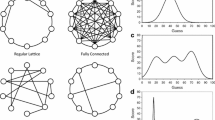Abstract
The ways we assume, observe and model “presence” and its effects are the focus in this paper. Entities with selectively shared presences are the basis of any collective, and of attributions (such as “humorous”, “efficient” or “intelligent”). The subtleties of any joint presence can markedly influence potentials, perceptions and performance of the collective as demonstrated when a humorous tale is counterpoised with disciplined thought. Disciplines build on presences assumed known or knowable while fluid and interpretable presences pervade humor. Explorations in this paper allow considerations of collectives, causality and the philosophy of computing. Economics has long considered issues of collective action in ways circumscribed by assumptions about the presence of economic entities. Such entities are deemed rational but they are clearly not intelligent. To reach its potential, collective intelligence research needs more adequate considerations of alternate presences and their impacts.
Access this chapter
Tax calculation will be finalised at checkout
Purchases are for personal use only
Preview
Unable to display preview. Download preview PDF.
Similar content being viewed by others
References
Berger, A.: What’s So Funny About That? Society 47(1), 6–10 (2010)
Binsted, K., et al.: Computational Humor. IEEE Intelligent Systems 21(2), 59–69 (2006)
de Bono, E.: I am right - you are wrong: from this to the new Renaissance: from rock logic to water logic, Penguin, Harmondsworth (1991)
Chandler, A.D.: The visible hand: the managerial revolution in American business. Harvard University Press, Cambridge (1977)
Coase, R.H.: The Firm, the Market and the Law. University of Chicago Press, Chicago (1988)
Davis, P.J., Hersh, R.: Descartes’ Dream. The world according to mathematics. Pengin, Ringwood (1986)
Mihalcea, R., Strapparava, C.: Learning to laugh (automatically). Computational models for humor recognition. Computational Intelligence 22(2), 126–142 (2006)
Minsky, M.: Jokes and the Logic of the Cognitive Unconscious. In: AI Memo No. 6031980. MIT, Boston
Olson, M.: The logic of collective action: public goods and the theory of groups. Harvard University Press, Cambridge (1965)
Raskin, V.: Semantic Mechanisms of Humor. Reidel, Boston (1985)
Raskin, V., Nirenburg, S.: Ontological Semantics. MIT Press, Cambridge (2004)
Ritchie, G.: Current Directions in Computational Humour. Artificial Intelligence Review 16(2), 119–135 (2001)
Russell, B.: An outline of philosophy. Allen and Unwin, London (1927)
Stock, O., Strapparava, C.: Getting Serious about the Development of Computational Humor. In: IJCAI 2003 Proceedings of the 18th International Joint Conference on Artificial Intelligence, Morgan Kaufmann Mathematics, Ringwood (1986)
White, E.B.: Some Remarks on Humor. Preface to: A Subtreasury of American Humor (1941)
Author information
Authors and Affiliations
Corresponding author
Editor information
Editors and Affiliations
Rights and permissions
Copyright information
© 2012 Springer-Verlag Berlin Heidelberg
About this paper
Cite this paper
McGovern, M. (2012). On Presence, Collective Performance and Assumptions of Causality. In: Altmann, J., Baumöl, U., Krämer, B. (eds) Advances in Collective Intelligence 2011. Advances in Intelligent and Soft Computing, vol 113. Springer, Berlin, Heidelberg. https://doi.org/10.1007/978-3-642-25321-8_9
Download citation
DOI: https://doi.org/10.1007/978-3-642-25321-8_9
Published:
Publisher Name: Springer, Berlin, Heidelberg
Print ISBN: 978-3-642-25320-1
Online ISBN: 978-3-642-25321-8
eBook Packages: EngineeringEngineering (R0)




